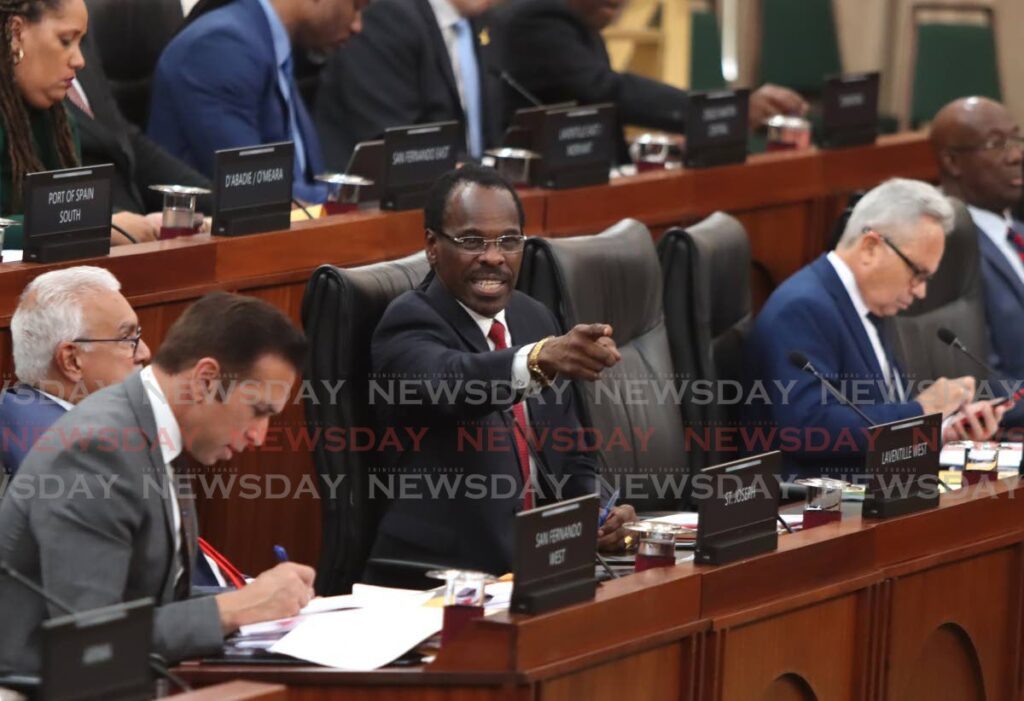United Senate passes polygraph bill

ALL 30 members present in the Senate on Tuesday unanimously passed a bill to allow the polygraph testing of police officers and other public employees in sensitive positions, the Miscellaneous Provisions (Testing and Identification) Bill 2022.
The bill allows heads of departments to order the polygraphing of specified officers under certain circumstances and/or their drug-testing and collection of their biometric data.
Minister of National Security Fitzgerald Hinds piloted the bill. He said the bill's aims – to bolster national security and reduce crime – were sufficient when weighed against the personal rights under the Constitution (sections 4-5) in a "proportionality test." He said those constitutional rights were not absolute.
Allyson West, Minister of Public Administration, said polygraph testing would not derail anyone's career but be used to enhance the safety of police officers on risky operations and to curb corruption.
The bill amends the laws governing state attorneys, prison officers, soldiers, police officers, civil (public) servants, fire officers and staff of the Financial Intelligence Unit (FIU.)
Addressing earlier concerns from Opposition Senator Jayanti Lutchmedial-Ramdial, West assured, "There are controls."
The minister said polygraph testing would not be used to seek evidence for use in a law court but rather be a tool to see if particular state officers could be relied upon. Citing participants in a sensitive police exercise, West said it was important to give their heads the power to give as much protection as possible to their front-line officers.
"These officers who work in these special units are placed in highly dangerous, volatile positions.
"If they cannot rely on and trust the people they work with, how can we ask them to put their lives on the line to protect us?"
Any rogue officer must be excluded from such an operation, she said, to reduce the risk to the good officers.
"It will enhance the trust and integrity of the arms of the State where there is a lot of activity."
Regarding Lutchmedial-Ramdial's call to exclude state attorneys from the bill's drug-testing provision, West said she did not expect every attorney to be tested every week but that if there was concern about one specific attorney, his supervisor should be able to determine if he was compromised by drug-use or presented too much exposure.
The minister said attorneys with access to property, information or files subject to investigation should be subject to polygraph testing.
"I say yes to testing attorneys."
West said the bill seeks to be very circumspect in stating the conditions under which polygraphing could be done so as not to be too wide nor be subject to abuse.
"I would also remind you, as a former Inland Revenue person myself, that we are not only seeking to protect the lives of TT, but we are seeking to protect the financial stability of TT."
West said each year, TT's tax collection falls short by $14 billion, even half of which would allow the funding of all schools and social welfare.
"If we can identify and treat with miscreants in the tax authority who hamper our ability to collect the amount of tax we should be collecting, then we will be far advanced."
She said staff of the new Revenue Authority must be of the right calibre and not vulnerable to being corrupted by bribes.
Law enforcement officers from other jurisdictions would not wish to work with officers from TT if they were suspected of being corrupt, she warned.
West assured the bill has safeguards to define the scope of polygraphing, the rights of interviewees, which units could be affected and who has the authority to order polygraphing.
She said the Police Complaints Authority director has endorsed polygraph testing to help identify rogue police officers.
Addressing the concerns of Lutchmedial-Ramdial, she said the bill's regulations would be debated in Parliament and be subject to affirmative resolution. West assured the opposition senator that wide consultations had been held with stakeholders likely to be affected.
West said under the bill, the corruption that citizens widely complained about could become the exception rather than the norm.
She disagreed with Lutchmedial-Ramdial's suggestion to exclude contract officers in the Public Service, saying many of them now handle "significant activities."
West said the bill was proportionate when weighed against personal rights in the Constitution, as considered in the Privy Council ruling in the Dominic Suraj case.
"You are talking about the right of an individual against the safety of a nation."
She noted that no individual rights were absolute.
West concluded the bill would have a significant impact in reducing the corruption that many people complained about, such as in the police service, defence force, Inland Revenue Department and Customs and Excise Division.
"I would ask every member of the Senate to give favourable consideration to this legislation."

Comments
"United Senate passes polygraph bill"